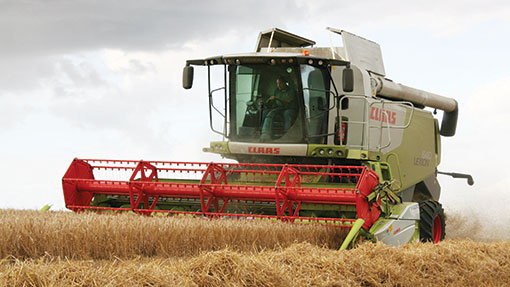Hurricane Bertha wreaks harvest havoc

The aftermath of Hurricane Bertha has caused significant delays to harvest across the UK this week, with many crops in Scotland damaged by high winds and rain.
In Morayshire, 104mm of rain fell in just 14 hours at Corskie Farm, Garmouth, where Iain Green was very concerned about his cereals.
“A lot of the spring barley has been flattened, and the crops will be coming to harm if it doesn’t dry up quickly, but the forecast remains wet this week – it’s just really frustrating,” he said.
It was a similar story at Raskelf Farm, York, where Ian Elsworth had recorded 50mm of rain over the weekend.
See also: Photos: The faces of harvest
“It’s too wet to do any field operations and the wheat is fairly ripe, so the rain isn’t going to do it any good. I’m really concerned about the bushel weight, as it can drop off in a matter of days.”
Further south, heavy showers slowed harvest progress, but a lot of wheat and spring barley was now cut. According to the HGCA/Adas harvest report, farmers nationally had cut 40% of their crops by 5 August. Wheat yields were above average, although protein contents remained low, it said.
Spring barley yields ranged from 5-8.75t/ha, with good quality, acceptable specific weights and malting nitrogen contents. Winter barley and oilseed rape harvest was nearing completion, and overall yields were above average, at about 7.3t/ha and 3.5t/ha, respectively.
Mycotoxin threat
With showers forecast, winter wheat growers must be aware of the increased mycotoxin risk and keep track of rainfall on a field-by-field basis, warned Dhan Bhandari at HGCA.
“When grain from different parts of a farm has different risk scores, it is important to keep it segregated if at all possible,” he said.
However, in some parts of the country the rain had arrived too late to do any damage. In Hertfordshire, Charles Martin finished combining winter wheat at Mill House Farm, Abbots Langley, last week.
Panorama winter wheat had yielded better than at just over 7.4t/ha, while Prophet peas had also done reasonably well, at 3.6t/ha. “We can’t really complain at that and it’s the earliest we’ve ever been able to harvest them.”
In Surrey, Giles Porter was also nearing the end of harvest at Penn Croft Farms, Farnham, having run flat out between 12 July and the onset of the showers.
Wheat yields had been generally very pleasing, with all fields doing 10t/ha or more and the best going a shade over 11t/ha. “For us, that’s amazing,” he said.
However, despite good yields at Skegby House, Marnham, Nottinghamshire, Robert Sutton remained frustrated by the lack of progress in recent years.
“The Diego did 9.5t/ha as a second wheat, which is good – but we were getting yields like this 20 years ago,” he said.

